Welcome to the informative series of Salesforce CPQ. In the previous part of this article, we’ve seen What Salesforce CPQ is, understood what actual configure, price, and quote are, how to sign in for CPQ enabled org, and many more.
You can go with this link if you have not read it yet.
In this blog post, we will learn more about CPQ and look at its key features.
Key Features of Salesforce CPQ –
1. Product Configuration:
In Salesforce CPQ (Configure, Price, Quote), product configuration refers to the process of dynamically assembling and customizing products or services based on the unique requirements and preferences of a customer.
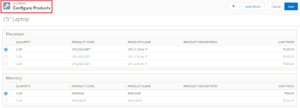
It allows sales representatives and users to guide customers through a step-by-step configuration process, ensuring that the final product or service aligns precisely with the customer’s needs.
2. Pricing Rules:
In Salesforce, pricing rules are a fundamental component of Salesforce CPQ. These rules are used to define how the price of a product or service is calculated based on various factors such as quantity, discounts, product features, or any other criteria relevant to the business’s pricing strategy.
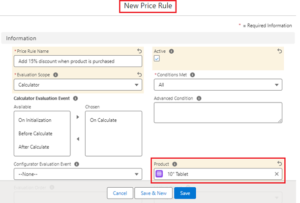
In the Price rule, you can define when the price rule should be evaluated like “On Calculate, On Initialization, Before Calculate, and After Calculate as shown in the figure above.
3. Quote Generation:
In CPQ, the quote generation process involves creating professional and accurate quotes or proposals for customers based on the configured products, pricing rules, and other relevant information.
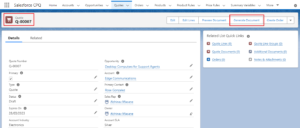
a. The generated quote is customizable, allowing users to add personalized messages, branding elements, and any specific terms relevant to the customer or deal.
b. CPQ supports approval workflows, which means approvers can review, approve, or request modifications to the quote as needed before being sent to customers.
c. CPQ can integrate with electronic signature platforms to facilitate the electronic signing of quotes.
4. Guided Selling:
Guided selling in Salesforce CPQ is a powerful feature designed to assist sales representatives in recommending the most suitable products or services to meet each customer’s unique needs.
It is done by creating a prompt that asks sales reps about the types of products they want to add to the quote and their specifications, just like an experienced sales rep does.
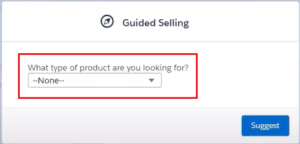
a. As shown in the above figure, guided selling involves the use of dynamic questionnaires or wizards that prompt sales representatives to ask specific questions during the sales process.
b. Based on the information gathered through the dynamic questioning process, CPQ provides intelligent product recommendations.
Thus, it becomes very easy for the customers to pick only the required product rather than searching for it in a catalog full of thousands of products.
5. Renewals and Amendments:
Managing contract Renewals and Amendments can be time-consuming and prone to errors, especially in subscription-based or recurring revenue models.
Salesforce CPQ simplifies this process by automating notifications, updates, and renewals. You can easily track and manage customer contracts ensuring a seamless experience for your clients.
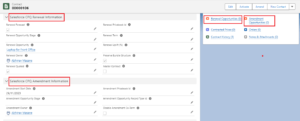
Renewals:
a. Salesforce CPQ automates the renewal process, allowing businesses to set up rules and workflows to manage renewals seamlessly.
b. Users can set up alerts to notify them when a customer’s contract is approaching its expiration date.
c. CPQ allows for easy modification of contract terms, quantities, or the addition/removal of products or features during the renewal process.
Amendments:
a. Salesforce CPQ enables efficient handling of contract amendments by allowing sales teams to modify existing contracts.
b. As amendments are made, CPQ provides real-time adjustments to pricing, ensuring that the updated quote accurately reflects the modified terms. (current price of the product)
c. Similar to the initial quoting process, amendments often require approvals.
6. Analytics and Reporting:
Salesforce CPQ offers robust analytics and reporting features that empower businesses to gain valuable insights into their sales processes, pricing strategies, and overall performance.
a. Users can create custom reports tailored to their specific business needs.
b. Dashboards in CPQ provide a visual representation of key metrics and trends.
c. Analytics in CPQ enables businesses to analyze the performance of individual products or product categories.
d. Analytics and reporting tools allow businesses to evaluate the performance of their sales teams.
7. Seamless Integration:
Salesforce CPQ seamlessly integrates with the broader Salesforce ecosystem, allowing for a unified platform where customer relationship management (CRM) data, opportunities, and quotes coexist.
a. The integration ensures that customer data stored in Salesforce CRM is readily accessible during the CPQ process.
b. CPQ seamlessly links opportunities and quotes, creating a cohesive connection between the sales pipeline and the quoting process.
In this way, we’ve seen the exceptional features of Salesforce CPQ. In the next part, we’ll learn about Quote Line Editor and many more.
Conclusion:
In this blog, we’ve seen the excellent features of Salesforce CPQ which stands as a powerhouse within the Salesforce ecosystem and revolutionizing the way businesses manage their Configure, Price, Quote processes.
Stay Tuned!!
References:
1. What is Salesforce CPQ?
2. Salesforce CPQ Guided Selling.
3. Salesforce CPQ Price Rules


yeah great
Thank you for sharing good information.